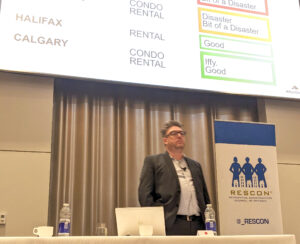
Housing plan odds not good
By Grant Cameron
Construction ResidentialNews shared at RESCON AGM paint a dour picture as Canada's housing crisis likely to get worse through 2024.
The housing supply and affordability crisis will likely get worse before it gets better, warned market specialists at the recently held Residential Construction Council of Ontario (RESCON) annual general meeting.
Marlon Bray, senior director, development advisory at Altus Group, figures that with statistics showing a slowdown in both low- and high-rise starts, 2024 will be another rocky year for housing.
In fact, he told the audience that the odds on hitting the goal of building 1.5 million homes in 10 years, as it stands today, are zero per cent, while the odds on the housing crisis getting worse are 100 per cent, as the market is “descending into chaos.”
To bolster his point, Bray showed graphs that indicated housing starts in Ontario were less than 90,000 in 2023, and would likely dip to 80,000 in 2024, before rising to 85,000 in 2025 and 88,000 in 2026. Meanwhile, condo sales in the GTA took a nosedive in 2023 while inventory was up.
Bray noted that much of what happens with new home sales will depend on the size of interest rate reductions and whether the economy sees a U-shaped, V-shaped or double-dip recovery.
His presentation indicated that development charges collected each year in Ontario continue to rise and, in 2022, the amount was up 72 per cent, compared to the 2019 figure. Development fund reserves in the province were up 77 per cent in 2022, compared to 2019.
Bray also said that housing affordability is resulting in more talent moving out of Ontario rather than into the province through immigration.
Daniel Foch, a real estate development advisor, offered insight into some of the challenges facing the market and noted that construction of new housing is not keeping up with population growth.
“We’ve seen quarter after quarter of record population growth in Canada, but the challenge is we’re underbuilding. We have too many people for the number of houses that are being created.”
He shared a graph showing that only 10 Canadian cities saw an increase in housing starts in 2023, while the majority are seeing a decline in starts. And more properties are now being sold via power of sale, he noted.
According to Foch, construction costs in Canada have increased 71.4 per cent since 2017.
In a perfect world, he said excess demand should create supply and, if it doesn’t, prices should rise, but that hasn’t been the case, as “house prices will go up when people can afford to buy and right now, they can’t.”
To restore housing affordability, Foch maintains prices would need to dip by 33 per cent, or incomes would need to rise by 55 per cent, or mortgage rates would need to fall by 350 basis points.
Presently, he said, the average home in Canada costs $741,400 and the minimum income required to qualify for the average Canadian home is $195,000. That means even the top 10 per cent of income earners with an average income of $175,000 would not qualify for a mortgage.
RESCON president Richard Lyall said in concluding remarks at the meeting that he appreciates the gravity of the situation and is hopeful that the tide can be turned.
“Our industry is fully committed to meeting the challenges that are facing us,” he said.
Grant Cameron is senior director of public affairs at RESCON.





